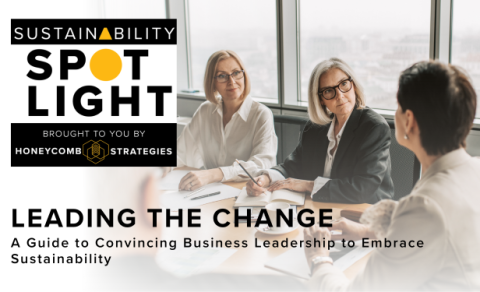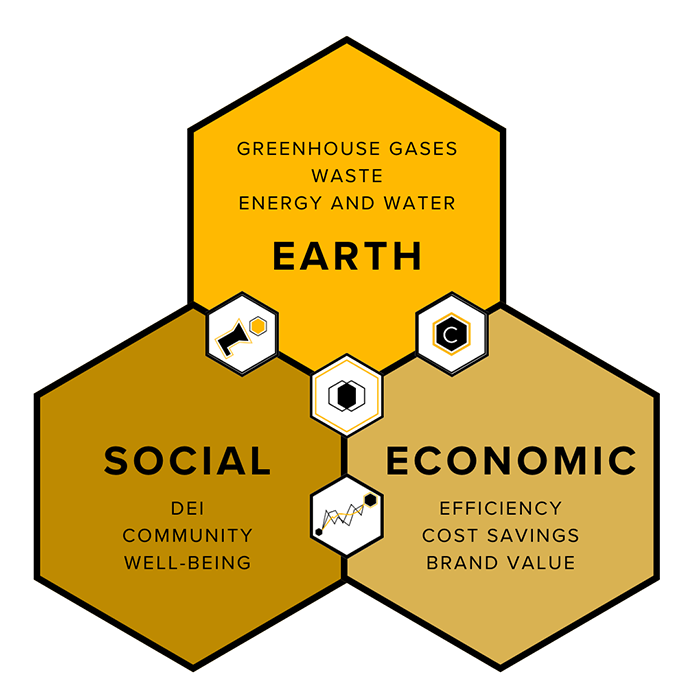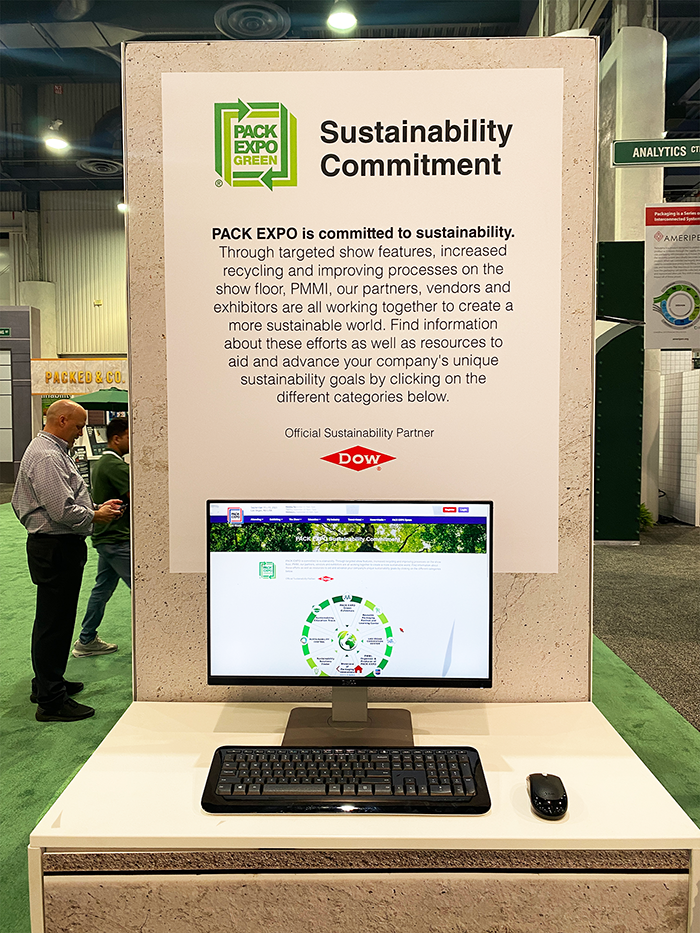Leading the Change: A Guide to Convincing Business Leadership to Embrace Sustainability

Exclusively sponsored by Honeycomb Strategies
“We’ve traced the call. It’s coming from inside the house.”
One of the largest challenges to incorporating sustainability into your event may be your own leadership, ownership or management. We’ve talked with a lot of event planners who struggle to convince decision-makers to greenlight improvements they perceive as irrelevant or optional. Increasingly, planners see the urgent need for sustainability, so Honeycomb Strategies has compiled this guide to help you talk with your leadership team to gain support for sustainability programs. (Note: while our expertise is in the event industry, these tactics work for any field).
Introduce the Triple-Bottom Line
Profitability is essential for any business, so you can begin your conversation with leadership in the C-suite using this angle. The triple bottom line, a model introduced in 1994 by John Elkington, examines a company’s social, environmental and economic impact to combat profit gained at the expense of environmental and social factors. While Elkington’s intent wasn’t to develop an accounting framework, it may be helpful to present it in this manner to entice finance-minded board rooms to include sustainability in their budget.
The basic guidance with the triple bottom line is that for any business decision – from supply chain management to branding – the outcome adds up to be net positive for at least two of the three considerations (economic, environmental and social) and neutral for the third. This is possible because all three factors of the triple bottom line holistically increase value, decrease risk and stabilize the business in the long term.
Tell Leadership: Invest in a sustainability framework that adds up to net gain or cost-neutrality with little margin for loss to the bottom line.

Explain the Gains of Efficiency
Sustainability requires a collaborative way of doing business, which can look like streamlined access to data, available and accurate reporting, standard practices, teams that work well across departments and group learning. Research has shown that collaboration in the workplace increases efficiency and drives productivity, according to Forbes. Returning to the accounting of the triple bottom line, the very process of aligning your event with company values like environmentalism or DEI can save your company money through efficiency.
Tell Leadership: Improve the efficiency of our internal team by embracing a new model for sustainable collaboration.

Target the New Sustainable Consumer
The world has changed. Recent industry research shows that consumers are concerned about the impact of their spending choices. The Freeman Trends Report Q1 2023 reveals Gen Zs and Millennials currently make up 38% of event-goers, and their values will be the driving force behind consumer behavior for the next decade (at least). According to The Deloitte Global 2022 Gen Z & Millennial Survey in 2022, “protecting the environment remains a top priority for Gen Zs and Millennials. About three-quarters of respondents believe the world is at a tipping point in responding to climate change.”
The next generation of event-goers are Gen Z and Millennials + These groups highly value sustainability = Events must incorporate sustainability to attract and retain the next generation of event attendees
When it comes to exhibitors and sponsors, sustainability impacts their participation as well. The Freeman Trends Report Q2 2023 reveals that “for large organizations, 50% responded that sustainability was influential” in their decision to have a presence at the live show.
Associations have to account for member companies that have strict ESG requirements for budget expenditures; to attend the show they must be satisfied that their dollars are spent with environmentally friendly, socially conscious businesses. This trend will only increase as climate change continues and market forces demand that live event sustainability become the new normal. Companies that don’t stay alert to the changing demands of their audience risk fewer exhibitors, attendees, sponsors and lowered brand relevance.
Tell Leadership: Imagine losing half of your large-scale sponsors because of an unwillingness to pivot and respond to your target audience’s values.
Pitch Value Creation
In contrast to the losses gambled through lack of action, there is an incredible opportunity to stand out reputationally with sustainable solutions. The same statistics quoted above about target demographics apply in the reverse: an event can build its perception as a leader by being responsive to consumer needs. Not only is an event responding to the demands of shifting values in its audience, but it also ensures relevance by staying on top of event industry trends. On the show floor, it’s a no brainer to be an expert on emerging trends in your business sector; it’s equally valuable to be ahead of the curve on event innovation.
According to the Deloitte Global Marketing Trends Report 2023, brands have increasingly chosen to lead by example in areas of sustainability and equity. By aligning purpose with programming, event brands demonstrate transparency, build community and counteract the perception of corporate greed. HubSpot’s 2023 State of Marketing Report reveals that 69% of marketers share values-based campaigns as a centerpiece of their marketing strategy. Again and again, we see that demonstrating corporate social responsibility is attractive to consumers.
Tell Leadership: Let’s build brand value by showcasing our commitment and responsiveness to all our stakeholders.

The Case for Compassion
In 2018, Elkington said, in a re-evaluation of his own concept of the triple bottom line, that “success or failure on sustainability goals cannot be measured only in terms of profit and loss. It must also be measured in terms of the wellbeing of billions of people and the health of our planet.”
It is incumbent on all people, businesses, governments and industries to do their part to protect both Earth’s people and the environment. The 2022 U.N. Annual Climate Report details the way in which climate and humanitarian crises are intertwined. We need drastic action to care for our planet and its living communities to ensure that events like conferences, expos and festivals stay operational and relevant for many generations to come.
Tell Leadership: Let’s be part of the solution to sustain the health of Earth’s people and environment. Because it’s the right thing to do.
Honeycomb Strategies specializes in impactful solutions for sustainable events and venues. www.hcsustainability.com Hello@hcsustainability.com


Add new comment